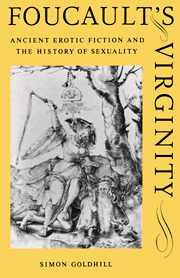1 - VIRGINITY AND GOING THE WHOLE HOG: VIOLENCE AND THE PROTOCOLS OF DESIRE
Published online by Cambridge University Press: 26 January 2010
Summary
I've been the whole hog plenty of times. Sometimes …
you can be happy … and not go the whole hog. Now
and again … you can be happy … without going any hog.
H. Pinter, The HomecomingImagine a symposium of young women, not of men; held not at a rich citizen's celebration of a theatrical success but in a paradise garden of soft trees and gentle breezes. Imagine this symposium led not by the ironic and satyric Socrates, but by Thecla, the tortured companion of St Paul. Imagine the Symposium committed not to praising desire, but to praising virginity: Tor exceeding great, awesome and worthy is Virginity.' This Symposium is the work of Methodius, a third-century Christian from the Aegean coast of Turkey: an eleven-book account not of ‘the god, Desire’, but of how ‘Virginity with but a bare change of letters is divinity’, (parthenia/partbeia). This little-read homily may stand as an icon for the major concerns of this and subsequent chapters, though the writings I will be mobilizing in general will be of quite a different order of righteousness, their symposiums less relentlessly sober.
First of all, the fetish of virginity for both men and women becomes through the course of later antiquity a key sign of what Peter Brown has called a ‘change in the perception of the body itself’.
- Type
- Chapter
- Information
- Foucault's VirginityAncient Erotic Fiction and the History of Sexuality, pp. 1 - 45Publisher: Cambridge University PressPrint publication year: 1995
- 1
- Cited by



